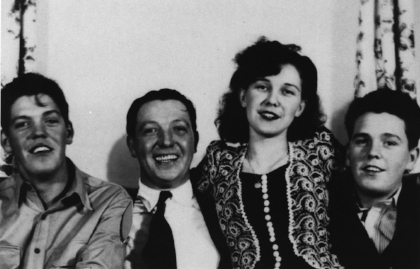A long-time friend of mine has asked me twice over the last few months, very earnestly, “What will our legacy be?” A college friend of his died a few months before, apparently putting this question in his mind; once we’re gone, how will people remember us? He means, of course, once he’s gone, how will people remember him?
My work on Kay Square’s latest book, A Philadelphia Family Goes to War (due out December 7), has opened my eyes about differences among memory, facts, and legacy. In my last blog, Necromancy, I recognized how easily things are lost to memory. Facts soon become long-forgotten, but facts can be found with effort. Facts about my parents are available, facts about my grandparents can be uncovered, facts about my great-grandparents must be dug out, and so on…facts become buried in time.
“Legacy,” however, is different than facts. Legacy is “how” a person is remembered—Einstein is remembered as a genius, Andy Warhol as an avant-garde artist, Abraham Lincoln as a determined leader of great vision. Legacy—at least the way my friend means it— seems to be a boiled-down version of a person’s full life, one’s reputation as the future perceives it. Legacy oftentimes is based on a single fact, if it's based on facts at all. Richard Nixon’s legacy is to be known as the first U. S. President to resign from office, regardless of his diplomacy with China or ending the Viet Nam War; John F. Kennedy’s legacy is to be known as the “assassinated president,” despite having stared down the Russians in Cuba or launching and inspiring the Moon landings.
Sgt. William J. Pawley, Sr.
While compiling the letters for A Philadelphia Family Goes to War, I found many new family facts that led me to a new sense of legacy. My grandfather, in particular, evolved in my perception beyond the facts: he grew up in a poor, tough, Irish-American neighborhood, “the Devil’s Pocket,” in southwest Philadelphia; he held his family together through the Depression and through the War; he supported his wife through her losing battle against tuberculosis; he supported and housed his parents and in-laws through their final days; he served as a Philadelphia policeman for 27 years.
William & Anna Pawley, April 1922.
But his letters—and a few recently discovered facts—belie a certain toughness that the facts suggest. During the war, he writes constantly about attending Mass and receiving the sacraments; he continually advises his sons to do the same. He senses and sends relief based on his faith when he writes to Jack in December 1944, “…keep up the Sacraments & God will take care of you.” He strives to be both mother and father to his family, even as his sons spread across the globe at war; in September 1945, he writes Jack again, “I would love to have a home that you & Bill would be proud to come back to but unfortunately I am only a man & not a combination of Mother & Father.” Surprisingly for a tough guy, my grandfather easily wrote about values, emotions, and faith.
I knew in the 1980s that my father had quit his job when he learned that the company had been falsifying advertising rates; I was very proud of him. I recently learned that my uncle had once quit a political committee when he learned that they were misappropriating funds; I was just as proud of him. But it soon occurred to me that the facts about these two men weren’t coincidental; their character and actions were a concrete expression of their values…values that must have come from, been reinforced by, and now become the legacy of their father, my grandfather: a tough guy who shared and lived his values, emotions, and faith.
I told my friend that the future will create our (his) legacy and he can’t know what it will be. For now, all he can do is know his values, live his values, and let the future make up its mind.


